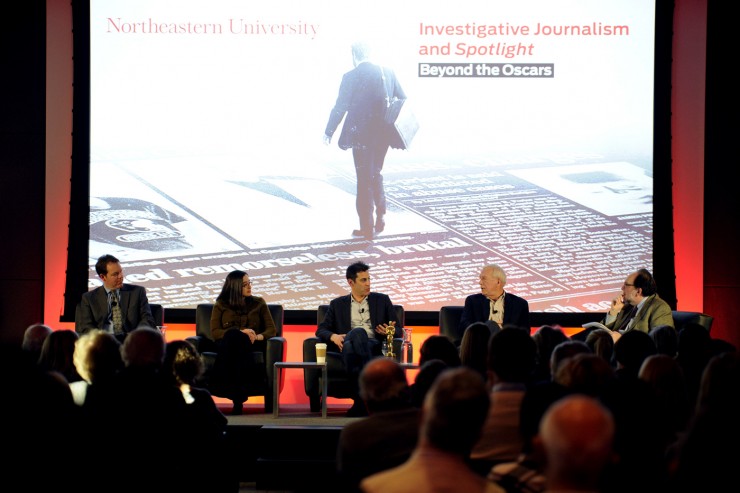Reporters, filmmaker shine ‘spotlight’ on investigative journalism

The final scene of the Academy Award-winning film Spotlight portrays the reporters and editors who made up The Boston Globe’s investigative team fielding a barrage of calls from survivors of the Catholic Church sex abuse scandal on the day in 2002 when the team broke the story.
Walter Robinson, AS’74, a former journalism professor at Northeastern and a Globe editor who led the Spotlight team, described that day as the end of the beginning for his team. Collectively they wrote some 600 stories on the scandal and earned the Globe the 2003 Pulitzer Prize for Public Service for their investigative work.
“I feel like our world exploded,” Robinson told a standing-room only crowd in the event space on the 17th floor of East Village. “And those phones rang for months. In just the first several weeks we had more than 300 victims just in the Boston archdiocese call us.”
Robinson shared those memories during a thought-provoking event on Tuesday evening that examined the making of Spotlight and how the work of those Globe journalists continues to impacted investigative journalism.
He was joined by Spotlight screenwriter Josh Singer, who reflected on how he came to write the screenplay and collaborated with McCarthy. In February, Spotlight won Academy Awards for Best Picture and Best Original Screenplay, the latter of which made an appearance at Tuesday’s event, which was sponsored by the College of Arts, Media and Design.

Walter Robinson, AS’74, right, hands Josh Singer the Academy Award Singer won for writing the screenplay for Spotlight. Photo by Matthew Modoono/Northeastern University
Other speakers included Rosalind Helderman, an investigative reporter with The Washington Post, and Mike Beaudet, a professor of the practice in Northeastern’s School of Journalism and an investigative reporter for WCVB-TV.

From left, Mike Beaudet, Rosalind Helderman, Josh Singer, Walter Robinson, and Jonathan Kaufman. Photo by Matthew Modoono/Northeastern University
Here are six takeaways from Tuesday’s discussion, which was moderated by Jonathan Kaufman, director of Northeastern’s School of Journalism.
• “For journalists, there was cheering in newsrooms when the Oscars were announced,” Robinson said when asked how the movie has impacted journalists. “So this is a great shot in the arm, but the question is how long before it wears off? Will editors start to think more seriously about their obligation to do reporting that really matters? Time will tell.”
• “From the very beginning, Tom’s vision on this was authenticity,” Singer explained, referring to his screenwriting partner and the film’s director Tom McCarthy. “I think he felt because of the subject matter, because of how he felt about journalism, he wanted to capture this in a very authentic way. And he was very much interested in the idea of a team, a championship team, which I think this Spotlight team was.”
• “Good storytelling is good storytelling, but I think we have to deliver it in different ways,” Beaudet said, referring to investigative journalism today. “I hope the lessons news managers learn (from Spotlight) is you can’t do this by simply saying you are going to cover investigative journalism. You have to be seriously committed to it.”
• “At the Post we are very focused on metrics,” Helderman said. “The number one best way to get a story read by many people is original, exclusive reporting. Telling people something they did not know and that they could not learn anywhere else.”
• “(Northeastern) is ground zero for experiential learning,” Robinson said. “For me there is no better place to prepare for a professional career than Northeastern, and that is particularly true for journalism where our students, because they are so bright and so motivated, and because they love the news so much, and because they have courses that provide them the opportunity, are able to do real journalism.”
• Investigative journalism is not a luxury, Robinson said, “it’s a necessity we can’t afford to do without.”


